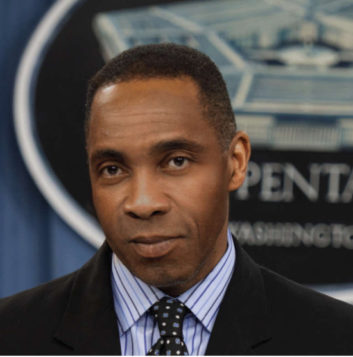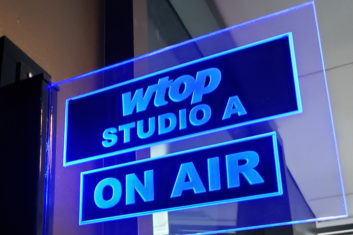
The general manager of one of the nation’s best known news stations has denounced anonymous listener racism directed at one of the station’s employees.
And the Black national security correspondent who was the target of racist bullying is highlighting the station’s response on social media: “[It shows] how investing in a diverse, equitable and inclusive work environment over time is a weapon against hate and bigotry.”
WTOP General Manager Joel Oxley penned an open letter to the WTOP community on July 21.
He acknowledged that the station, which is owned by Hubbard Broadcasting, receives its share of constructive criticisms and said many of those are valid.
“And that’s all OK. We’re not perfect,” said Oxley, who has served as the station’s general manager since 1998. “We strive to be accurate all the time. We aim to be unbiased. At WTOP, we are glad to get the feedback. It makes us better — negative, positive and in-between.”
But he drew a strong line at feedback that is outright racist, focusing on a letter that the station had received from an anonymous author in Bowie, Md.
In his post Oxley called out the writer in no uncertain terms, posting an image of the letter and saying that this kind of missive cannot go unaddressed. “[This] is the communication that really bothers me,” he said. “The kind that is racist. The kind that gets my back up. Makes me angry.”
In the letter the author criticizes reporter J.J. Green and WTOP for their ongoing discussion of race, racism and the Black Lives Matter movement. Green is WTOP’s national security correspondent and co-creator of the podcast Colors: A Dialogue on Race in America.
The unnamed author logged a litany of what he called “tired” messages about “Black excuses,” “Black crime,” “thugs” and the BLM movement that he retitled “Burn, Loot, Murder.”
 “I can assure you and all of WTOP that we are all sick and tired of hearing about racism,” wrote the letter writer. “No one believes in systemic racism. Just an excuse Blacks use for not improving themselves.”
“I can assure you and all of WTOP that we are all sick and tired of hearing about racism,” wrote the letter writer. “No one believes in systemic racism. Just an excuse Blacks use for not improving themselves.”
“Stop the BS,” the author wrote. “We don’t want your podcast.”
Oxley wanted his audience to understand that J.J. Green is an award-winning journalist highly respected in the halls of the Pentagon and at the CIA. “We are very fortunate to have him working with us. He makes us better and helps our area be more informed,” Oxley said.
Beyond Green’s work as a reporter, he added, “he is my friend. I’ve known him for over 30 years. We met playing basketball in the ’80s. We started working together at WTOP in the ’90s. We’ve been through a lot together, and I have nothing but respect for one of the smartest and most caring people I know.”
The real reason that this listener wrote, he continued, is because Green and podcast co-host Chris Core have done a “tremendous job” taking a hard look at race relations. “They’ve done it in a balanced, thoughtful and insightful way.”
This anonymous writer — like others before — attack and discredit what they do not understand instead of stopping to listen and learn.
“J.J. is Black. And I’m white,” Oxley wrote. “Shouldn’t matter, right? But obviously it does to the person who wrote this letter. My goal with my response to this is to expose this kind of racial intolerance and ignorance in the hopes of putting more and more of it behind us for good.”
Green responded in turn, saying that such attacks are not new and are not limited to Black journalists. “During more than 30 years in radio and TV, I’ve gotten thousands of angry letters, phone calls and emails,” he said. But this one — with its unbridled, uncivilized and racist rants — led to a a different outcome: His boss, who happens to be white, stood up and demanded it stop.
“Joel Oxley … took the extraordinary step of writing an open letter … rejecting the hater, standing by my work and sending the message that we are living in a new day,” Green said.
“Let me be clear, no boss, regardless of race or gender, has ever gone this far for me,” he said. While there have often been mangers willing to express their disdain for racist communications, no one else knew about it. “Some may wonder why the big deal,” he said. “The big deal is that by Joel Oxley standing up against hate, he willingly made himself a target and established himself as a true leader in the fight against racism.”
He called that a model for industry about how to send a clear message disavowing racist acts.
Oxley said the incident will only make WTOP and its staff redouble their efforts.







